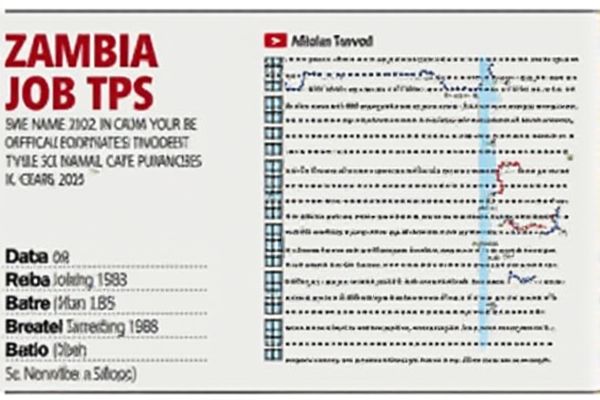
Zambia's job market offers a range of opportunities for statisticians in various sectors, including government, healthcare, and finance. Organizations such as the Zambia Bureau of Statistics, local universities, and non-governmental organizations frequently seek skilled professionals to analyze data and develop insights. Positions may include data analyst, statistical consultant, and research officer, each playing a vital role in evidence-based decision making. Staying updated on emerging trends in data science and statistical software can enhance job prospects and appeal to potential employers.
Job Description
Statistics jobs in Zambia typically involve data collection, analysis, and interpretation to support informed decision-making in various sectors such as healthcare, agriculture, and education. Positions may require proficiency in statistical software, strong analytical skills, and the ability to communicate findings effectively. You may find opportunities in government agencies, research institutions, and private companies focusing on data-driven strategies. Understanding local demographics and economic trends is essential for effective statistical analysis in this rapidly developing nation.
Requirement
In Zambia, statistics jobs often require a strong foundation in data analysis and statistical software, such as R, SPSS, or Python. Employers typically seek candidates with a bachelor's degree in statistics, mathematics, or a related field, along with experience in data collection and interpretation. Essential skills include analytical thinking, attention to detail, and the ability to communicate findings effectively to both technical and non-technical audiences. Familiarity with local economic trends and issues can also enhance your appeal to Zambian employers in this field.
Salary and Perks Expected
Statistics jobs in Zambia offer a range of salaries that can vary significantly based on experience and industry. Entry-level positions typically start at around ZMW 5,000 to ZMW 10,000 per month, while experienced statisticians can earn between ZMW 15,000 and ZMW 30,000 or more. Benefits often include health insurance, paid leave, and sometimes opportunities for professional development through training and workshops. As the demand for data analysis grows in sectors such as healthcare, finance, and agriculture, job security and advancement potential in statistics are becoming increasingly favorable.
Similar Job Names
- Statistician
- Data Analyst
- Research Analyst
- Biostatistician
- Quantitative Researcher
- Data Scientist
- Market Research Analyst
- Demographer
- Statistical Consultant
- Survey Statistician
- Actuary
- Business Intelligence Analyst
- Social Scientist
- Clinical Data Analyst
- Risk Analyst
Job Expectation Concept
In Zambia, statistics jobs typically involve data analysis, interpretation, and reporting to inform decision-making processes across various sectors, such as healthcare, education, and agriculture. Employers often seek candidates with strong analytical skills and proficiency in statistical software, allowing for effective data management and presentation. A solid understanding of local issues, policies, and economic factors is essential for contextually relevant data analysis. Pursuing professional development in statistical methods and data science can enhance your prospects in this evolving job market.
Career Advantage and Weakness
Statistics jobs in Zambia offer strong career advantages due to the growing demand for data-driven decision-making across various sectors, including agriculture, health, and finance. Professionals in this field may benefit from competitive salaries and opportunities for advancement, as organizations increasingly seek skilled analysts to interpret data and inform strategies. Challenges in statistics roles may include limited resources, a lack of infrastructure, and the need for continuous skill development to keep pace with technological advancements. Staying updated on evolving methodologies and software can empower you to navigate these obstacles successfully and enhance your career prospects in Zambia.
Important Thing Must Know
Statistics jobs in Zambia offer diverse opportunities across various sectors, including government, healthcare, finance, and education. Many organizations seek individuals skilled in data analysis, interpretation, and statistical software, making expertise in tools like SPSS and R highly valuable. The growth of data-driven decision-making has increased demand for statisticians who can provide insights into national and local issues. You may find positions in research firms, NGOs, or public sector agencies that emphasize evidence-based policies. Pursuing certifications or advanced degrees in statistics can enhance your employment prospects in this competitive market.
Alternative Career Options
Statistics jobs in Zambia offer various alternative career paths that leverage analytical skills. Roles in data analysis, market research, and business intelligence are increasingly in demand as organizations seek to make data-driven decisions. You can explore opportunities within government agencies, non-profits, and private sectors that require data interpretation for policy-making or program evaluation. Specialized fields such as healthcare statistics, financial analysis, and education assessment also provide rewarding career options in Zambia.
Companies List
- Zambia Statistics Agency
- National Bank of Zambia
- Zambia Development Agency
- Zambia Revenue Authority
- African Development Bank
- World Bank
- Ministry of Finance
- Copperbelt Energy Corporation
- Lafarge Zambia
- First Quantum Minerals
- Zambia National Commercial Bank
- Airtel Zambia
- ZESCO Limited
- Zambia Environmental Management Agency
- Southern African Development Community (SADC)
List of Ideal City
Lusaka, the capital of Zambia, offers a burgeoning job market for statistics professionals, with numerous government agencies and NGOs seeking analytical talent. Ndola, known for its industrial sector, presents opportunities in data analysis within manufacturing and commerce. Kitwe is another city where your skills in statistics can be advantageous, particularly in research and educational institutions. Living in these cities allows you to engage with diverse projects that impact both local and national development initiatives.
 zambia-jobs.com
zambia-jobs.com